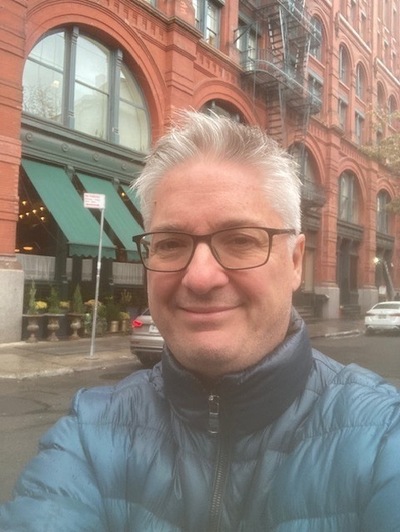
Rob Lewis received his bachelor of arts degree at Notre Dame in 1988, majoring in both the program of liberal studies (PLS) and Italian.
He currently serves as a speechwriter and executive communications lead at IBM, authoring internal and external CEO speeches, executive correspondence, and other communications.
Previously, Lewis served as the assistant commissioner of strategic and executive communications at the New York Police Department (NYPD), chief speechwriter to the commissioner of U.S. Customs, and personal aide to New York’s former U.S. Senator Daniel Patrick Moynihan.
His career has spanned various fields, ranging from politics to business.
Lewis says the most memorable PLS classes he took during the program were the seminars, “because of the interactions we had with one another and with the professor leading it, but also because to me, basically, the seminars were an exercise of Socratic dialectic method. You have that dialogue between participants with the goal of arriving at some greater truth through reasoned argumentation.”
He also recalls Intellectual and Cultural History, Philosophical Inquiry, and the Fundamental Concepts of Natural Sciences as notable classes.
The program, Lewis says, “taught me how to be a better listener, how to be a better speaker, and how to be a better writer, all of which were very important to the profession I wound up in.”
Invisible Man, War and Peace, Democracy in America, and The Brothers Karamazov are some of his favorite texts he read in the program. He chose to write his PLS thesis on Plato’s Symposium and St. Teresa of Avila’s The Interior Castle.
“That made a big impression on me,” Lewis says, speaking of Symposium. “It explores the differences between true and false rhetoric through the teachings of Socrates.” Lewis was struck by what he identifies as, “the exploration of the power of rhetoric and how it should be employed for the truth.”
Overall, he says, “PLS gave me a core skillset in how to read and analyze text closely, how to think critically, how to ask the right questions, and how to write with great precision, clarity, and depth.”
After Notre Dame, Lewis went to Washington, D.C. to pursue an interest in politics and government.
As a junior staffer on Capitol Hill, he relied on his broad familiarity with texts from the PLS program to help conduct research for a senator well known for peppering his speeches with classical references. In drafting statements, he was met with, “an exceedingly demanding editor who upheld the highest standards of language, not unlike PLS professors. So again, I felt that I was well prepared for that.”
After the events of September 11th, 2001, Lewis was heavily involved in articulating the law enforcement response from government at both the federal and local levels, first at U.S. Customs and then the NYPD, where he served for 12 years.
Lewis shares that PLS prepared him for all his professional experiences. “Whether you’re writing speeches for government or business in the tech industry, it’s an activity that draws upon many different fields of knowledge. It draws on politics, it draws on art, history, science, philosophy, and religion," he says. "Again, PLS gave me exposure to a lot of those subjects and that core familiarity with the philosophical and intellectual traditions that underpin the economic and political systems that I was writing about.”
When speaking of his current role, Lewis says that his main attraction to IBM is that, “it’s a company that has always been engaged in trying to solve big societal challenges with the help of technology and they’re very engaged with a lot of different organizations to advance that mission.”
“It is still intellectually stimulating to me,” he adds. “Especially given how technology is impacting the world so significantly in many different ways.”
Lewis also emphasizes the importance of a bachelor of arts degree because, “critical decision-making is something that really calls upon the diversity of skills one acquires through a liberal arts education. It’s in demand and it’s needed.”
The liberal arts offered Lewis a holistic foundation. He says, “It’s not just about finding a job; it’s about becoming a better, more informed, and capable human being. And that’s what this education helps you to become.”
